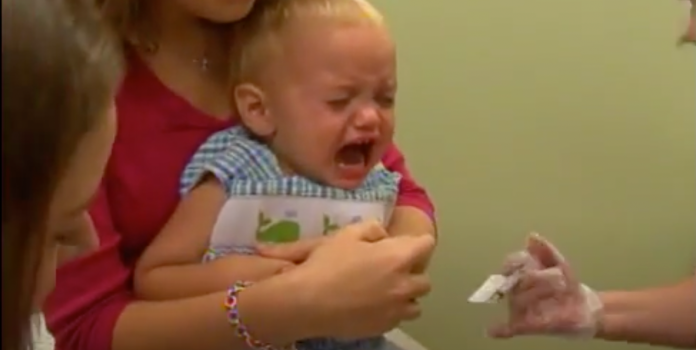(Headline USA) U.S. regulators are urging drugmaker Pfizer to apply for emergency authorization for a two-dose regimen of its COVID-19 vaccine for children 6 months to 5 years old while awaiting data on a three-dose course, aiming to clear the way for the shots as soon as late February, a person familiar with the matter told the Associated Press Monday.
The company’s application was expected to be submitted as soon as Tuesday.
Early Pfizer data has claimed the vaccine—which is administered to younger kids at one-tenth the strength of the adult shot—is safe and produces an immune response.
But last year Pfizer announced the two-dose shot proved to be less effective at preventing COVID-19 in kids ages 2-5, and regulators encouraged the company to add a third dose to the study on the belief that another dose would boost the vaccine’s effectiveness much like booster doses do in adults.
There is little evidence to suggest that the vaccine is necessary for children, who have extremely low risk of suffering adverse effects from the virus to begin with.
Since the vaccines have proven ineffective at reducing transmission, skeptics argue that the focus should be on vaccinating those in higher-risk categories.
Mounting evidence also has suggested that the adverse health risks from the vaccine itself—in particular, the heart condition myocarditis—are greater than the risk of illness from the vaccine in younger populations.
But approval from the Food and Drug Administration would clear the way for schools and other institutions, including city and state governments, to impose vaccine mandates on all age groups that would limit the ability to engage in everyday public activities.
It also may help limit the legal liabilities of the pharmaceutical companies and those who impose vaccine mandates in the event of adverse outcomes.
Currently, the FDA is pushing Pfizer to submit its application based on the two-dose data for potential approval in February, and then to return for additional authorization once it has the data from the third dose study, which is expected in March, the person familiar with the matter said.
The two-step authorization process could mean that young children could be vaccinated more than a month earlier than previous estimates, assuming the FDA and the Centers for Disease Control and Prevention greenlight the shots.
The person spoke on the condition of anonymity to discuss sensitive regulatory issues. The person said the decreased effectiveness of the two-dose vaccine was not unexpected given the emergence of the highly transmissible omicron variant of COVID-19.
Allowing young kids to be vaccinated with a two-dose shot earlier would ultimately accelerate when they could get the third dose.
Speeding the authorization of pediatric vaccines against COVID-19 has been a priority for more than a year of the Biden administration, which believes them critical to reopening and keeping open schools and day care centers—and for freeing up parents occupied by childcare responsibilities to return to the workforce.
Vaccines for kids ages 5-12 were approved by U.S. regulators in November, though uptake of shots has been slower than U.S. officials hoped.
Pfizer’s primary series is administered three weeks apart. The third dose for young kids is being studied for administration at least two months after the second dose.
News of the earlier regulatory review was first reported by the Washington Post.
Adapted from reporting by the Associated Press

